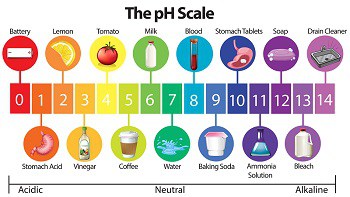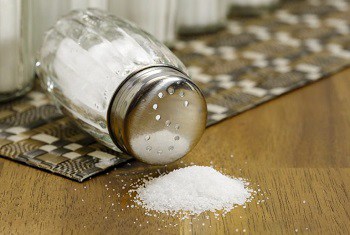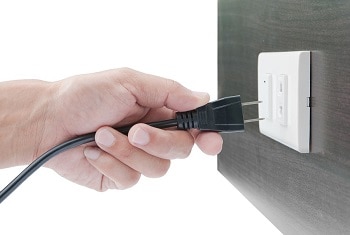We have all heard how important it is to drink plenty of clean, pure water. And there has been lots of hype about how alkaline water is better than regular water. And you have probably seen that many people that you know have reverse osmosis systems, but what is alkaline water, and is it the same as reverse osmosis water?
Which Is Better Reverse Osmosis Or Alkaline Water? Reverse osmosis reduces dissolved solids like salt in water and reduces its pH. Alkaline water is water with a high pH that can neutralize the acid in water. Both are beneficial for different reasons, it all depends on what improvements you want in your water.
Naturally, reducing the amount of salt and other dissolved solids in your water is a good idea, and many people believe that drinking water that is high in alkalinity has certain health benefits. Let’s see which will benefit you the most, and why you might want both.
What does Alkaline mean?
There is a lot of confusion about just what the term Alkalinity means. Most people interpret high pH as being alkaline when actually, alkalinity is just the ability of water to neutralize the acid.
Although water with a high pH is more able to neutralize acid than water with low pH, both may still have the ability to become more acidic.

Water with a pH of 6 can still neutralize acid, and water with a pH of 8 can neutralize acid as well. The pH is of a sample of water is simply a measure of the acidity of the water.
The higher the pH of a sample of water, the less acidic it is, and alkalinity is the ability of water to neutralize the acid.
What is reverse osmosis water?
The process of reverse osmosis is used to significantly reduce the number of Total Dissolved Solids or TDS in your water. Usually, the primary reason that people purchase a reverse osmosis drinking water system is for the reduction of sodium in their water.
Besides the reduction of Total Dissolved Solids in your water, most popular reverse osmosis systems consist of a sediment pre-filter, and one or more carbon-based filters to remove chemicals and particles that can make the water taste or smell odd.
Check out this quick video on how a reverse osmosis system works!
Besides the reduction of Total Dissolved Solids in your water, most popular reverse osmosis systems consist of a sediment pre-filter, and one or more carbon-based filters to remove chemicals and particles that can make the water taste or smell odd.
Because the process of reverse osmosis removes minerals in the water that helps to neutralize the acid in the water, the water that is produced by a reverse osmosis drinking water system will normally be acidic.
However, many reverse osmosis systems have a re-mineralization stage that will add beneficial minerals back into the water and also raise the pH. Depending on the pH of the water going into the system, this stage can produce water that is well above neutral.
What happens in your body when you drink alkaline water?
Some people believe that drinking alkaline water has a significant effect on your body, but this is a matter of opinion. There have been studies that claim that alkaline water is more hydrating, but this was based on self-testing of individuals, and not in a properly controlled environment. (source)
Some say that alkaline water is beneficial to the digestive system, but this is under debate as drinking alkaline water would neutralize the acid in the stomach which would more likely inhibit digestion.
Actually, once you drink any water, it will soon become the same pH as the rest of the body because the body is very efficient at keeping its pH balanced.
The human body steadily maintains an overall pH of 7.4 with only a very slight occasional variance. The drinking of a few glasses of alkaline water per day that has a high pH is not likely to be enough to change your overall body pH by much, and certainly not for very long.
Is reverse osmosis water alkaline?
Reverse osmosis water has had the acid-neutralizing minerals removed from it that would allow it to be alkaline. But this does not mean that the water produced by a reverse osmosis drinking water system is very acidic.
Typically, water produced by an under the sink reverse osmosis system will only be slightly acidic, having a pH that is below 7.0 but not as acidic as many other drinks that we drink every day, like coffee or soft drinks.
Unlike coffee or soft drinks, there is something that we can do to reverse osmosis water to raise the pH, often too a neutral level that is above 7.0.
Adding an in-line pH mineral cartridge to a reverse osmosis system will help neutralize the acidic reverse osmosis water.
If you are concerned about excess sodium in your water but want to keep the pH of your drinking water, consider a reverse osmosis system with a pH mineral cartridge. This will give you the pure water that you need, and the high pH water that you want.
Will reverse osmosis water make your body more acidic?
When you drink reverse osmosis water, it goes into your stomach which is far more acidic than any reverse osmosis water. Many of the foods and beverages that we consume are far more acidic than reverse osmosis water, and even they do not significantly make your body more acidic.
Do alkaline pitchers also remove dissolved solids, like sodium?

An alkaline water pitcher is in no way a reverse osmosis drinking water system. In order to raise the pH of the water that you put in the pitcher, they mostly use simple calcium and other minerals in the filters which neutralize the acid in the water.
Many alkaline water pitchers also use a form of carbon to reduce any chlorine or other particles in the water that may affect the taste or smell of the water.
But alkaline water pitchers do not do anything to reduce or remove dissolved solids from the water. If they did remove dissolved solids from the water, they would be producing acidic water rather than water with a higher pH.
In order to have water that has had unwanted dissolved solids removed from it, and have water that has a high pH, a reverse osmosis system with a pH raising cartridge would provide you and your family with great tasting water that has a higher pH than regular reverse osmosis water.
Reverse osmosis systems reduce minerals in the water where alkaline pitchers add minerals.
Does reverse osmosis water taste different than alkaline water?
Reverse osmosis water and alkaline water can taste very different from each other because they are very different from each other but the difference is not the only thing that can make them taste different.
Because reverse osmosis water is acidic, some people may experience a bitter taste if they are on some regular medications because of how the medications affect the chemical balance of their bodies.
Also, acidic reverse osmosis water has been found to cause a metallic type taste when a person has had dental work that consists of metal alloys of other materials. This has caused different tastes in different people believed to be because of their diet and their bodies’ chemical make-up.
Since the process of reverse osmosis removes minerals that can give the water certain types of tastes, alkaline water may have a smoother, milky taste that would not be found in the same water after it has gone through a reverse osmosis system.
Many people say that they like the taste of alkaline water better than the taste of reverse osmosis water, but they often think that the difference in taste is because the water is alkaline, but in actuality, it is usually because the alkaline water has not been purified like the water from a reverse osmosis system.
Do reverse osmosis systems require electricity?

The most popular reverse osmosis systems available do not require any electricity at all. They work with the existing water pressure that you already have coming from your home. But there are a few exceptions.
A residential reverse osmosis system will generally require a minimum of 40 pounds per square inch (psi) of water pressure to operate correctly and will operate most efficiently at 60 pounds per square inch (psi) of water pressure.
For situations where the water pressure is below the minimum of 40 PSI, a reverse osmosis system with a booster pump may be a better choice.
A booster pump will raise the PSI of the water going into the reverse osmosis system to make it work more efficiently, and therefore it will produce higher quality filtered water.
A reverse osmosis system that uses a booster pump will need electricity to power the pump, but it is usually powered by standard home electricity and no additional electrical work is needed.
The other exception to the rule is if you are interested in getting a reverse osmosis system with an ultra-violet purification stage.
This additional stage uses an ultra-violet light which will need to be plugged into a standard electrical outlet in order to sanitize your water.
Both of these stages on a reverse osmosis system do not apply to use an alkalinity water pitcher since an alkalinity water pitcher has no stages that require electricity.
See my article “Do you need electricity to operate an RO“
Can reverse osmosis water become alkaline?
Technically, water that is produced by reverse osmosis has had the majority if not all of the minerals that can neutralize the acid that is in the water removed from it, and therefore it can not be alkaline.
But, by adding beneficial minerals that can also neutralize the acid that is in the water, you can get all the benefits of a reverse osmosis drinking water system, and still have drinking water that has a higher pH than normal reverse osmosis water.
How can I make my reverse osmosis water alkaline?
If you already have a reverse osmosis drinking water system and would like to make the water more alkaline, you can add a re-mineralizing cartridge to your existing system which will raise the pH of the water.
You simply add the re-mineralizing cartridge in-line with the reverse osmosis outgoing water line, and the water will dissolve some of the minerals from the cartridge as it goes through it.
The re-mineralization cartridge comes with 1/4 inch quick connect tubing fittings, if your reverse osmosis tubing going to your faucet is 3/8 inch, you may need two 1/4 inch to 3/8 inch tubing adaptors to install it.
Just because water is alkaline, doesn’t mean that it’s healthy.
There is a lot more to healthy water than just a high pH! Even if high alkalinity in water was the healthiest characteristic of water, having un-healthy impurities in your drinking water could be far worse than having acidic water.
Because our bodies are very capable of balancing out their pH, I would much rather drink water that has greatly reduced impurities like water from a reverse osmosis system than water with a high pH but still has high sodium, chlorine, or other impurities in it.
Alleged health benefits of alkaline water.
Alkaline may be better at hydrating your body.
Although this has not been proven, alkaline water is believed by some people to be more effective at hydrating the body than water with a low pH.
Because this claim has not been proven and even the results stated that the additional hydration was minimal, I am not quite ready to jump on the alkaline water hydration bandwagon.
Alkaline water may help sufferers of acid reflux.
It makes some sense that less acid in your diet would lessen the chance of experiencing acid-related health issues. It is also believed that pepsin in our body is the primary contributor to acid reflux symptoms.
In a study about how an acidic diet can affect people that suffer from occasional acid reflux, it was estimated that maintaining a less acidic diet was able to help about half of the people that participated in the study. (source)
Conclusion:
So, as you can see, there is quite a difference between water that has been filtered by a reverse osmosis system, and water that has had its pH raised by an alkalinity water pitcher.
The real question is not which one is better, but which one, if not both will benefit you and make your drinking water better tasting and healthier for you and your family.

